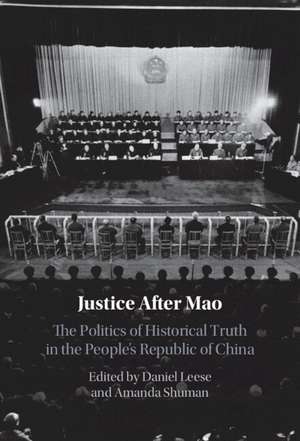Justice After Mao: The Politics of Historical Truth in the People's Republic of China
Editat de Daniel Leese, Amanda Shumanen Limba Engleză Hardback – 13 sep 2023
Preț: 728.05 lei
Preț vechi: 846.57 lei
-14% Nou
Puncte Express: 1092
Preț estimativ în valută:
139.31€ • 145.17$ • 115.35£
139.31€ • 145.17$ • 115.35£
Carte tipărită la comandă
Livrare economică 03-17 aprilie
Preluare comenzi: 021 569.72.76
Specificații
ISBN-13: 9781009261296
ISBN-10: 1009261290
Pagini: 357
Greutate: 0.61 kg
Editura: Cambridge University Press
Colecția Cambridge University Press
Locul publicării:Cambridge, United Kingdom
ISBN-10: 1009261290
Pagini: 357
Greutate: 0.61 kg
Editura: Cambridge University Press
Colecția Cambridge University Press
Locul publicării:Cambridge, United Kingdom
Cuprins
Introduction Daniel Leese and Amanda Shuman; Part I. Property: 1. Between revolution and law: Merchant families' struggles for property rights and justice under Mao and Deng, 1949–1984 Zhaojin Zeng; 2. What right to property when rebellion is justified? Revolution and restitution in Shanghai Puck Engman; 3. The pursuit of transitional justice from below: A case study from Shanghai Qin Shao; Part II. The Mechanics of Rehabilitation: 4. Dealing with victims of the Cultural Revolution: The case of the Guangxi killings, 1983–1987 Guoqing Song; 5. Villagers, cadres, and the politics of rehabilitation in post-Mao China, 1979–1982 Long Yang; Part III. The Politics of Truth: 6. Local reassessment versus central prestige: Tao Zhu, land reform, and the Pine Hill incident Mark Czeller; 7. New verdicts on the printed page: Expurgating the ,Gang of Four, in the publishing industry, 1976–1978 Matthew Wills; Part IV. Memory: 8. Narratives and voices of Cultural Revolution ,perpetrators, Man Zhang; 9. Coping with a traumatic past: Wang Bing's documentaries He Fengming and Dead Souls Flora Lichaa; 10. From individual guilt to public remorse: The ,Confessions, (Chanhuilu) column in the journal Yanhuang Chunqiu Sebastian Veg; Afterword: The Chinese Communist Party's politics of historical justice in perspective Daniel Leese.
Descriere
A ground-breaking collection addressing historical justice post-Mao through issues of property, rehabilitation, reconciliation, and memory.
